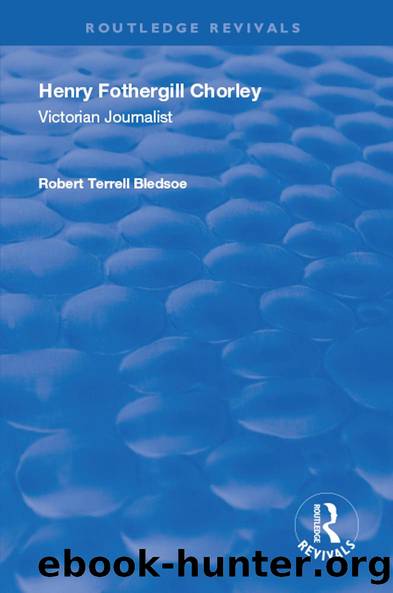Henry Fothergill Chorley by Robert Terrell Bledsoe

Author:Robert Terrell Bledsoe [Bledsoe, Robert Terrell]
Language: eng
Format: epub
ISBN: 9781138317437
Barnesnoble:
Publisher: Taylor & Francis
Published: 2020-06-30T00:00:00+00:00
2 Gounod: The Discovery
Chorley announced Gounodâs genius to the English reading public in âMusical and Dramatic Gossipâ for 26 January 1850. He predicted there on good authority that a great new composer was about to emerge in France (107). Not long after that, Viardot introduced Chorley to Gounod, and Chorley reacted as if thunderstruck, recording in his journal for March, 1850: âIt was great pleasure to me in Paris to add to my list of sensations Gounod, of whom the world will one day hear as the composer, or else H.F.C. is much mistakenâ (Hewlett, 2: 94). That same month in the Athenæum Chorley announced that the ânew composerâ â as we know from âprivate informationâ was writing an opera for the Opéra, to be performed in next winterâs season (23 March 1850: 321).
Again in the issue of 27 April 1850, Chorley mentioned the French âcomposer of extraordinary distinction and promiseâ (259). Gounod is mentioned by name in the issue of 22 June 1850, where the âGossipâ mentioned that he won a prize for composition ten years ago at the Conservatoire and that in his new opera there would be a principal part for Viardot.
Gounod sent Chorley some sacred choral works, hoping he could get them performed (MS letter cited in Huebner, Gounod: 34); Chorley obligingly urged John Hullah to agree to perform them. This created awkwardness, as Frances Hullah explained, since Chorley was more certain of their genius than was Hullah. As Hullahâs wife later recalled, Chorley,
having found âa new composer, Gounod by name,â wished to secure him a hearing rather on trust, Mr. Hullah preferring to wait till he could call on Gounod in Paris, where he meant to pass his next Easter vacation. Fortunately he was able to agree with Mr. Chorley in his estimation of Gounod, though he wrote somewhat cautiously: âI carried off four compositions from Madame Viardotâs house ⦠Of these things it is difficult to speak confidently. A great original musical genius is such a creation that one is slow to come to any conclusion. That the pieces I have seen and heard, in a way, are thoroughly workmanlike is their least praise; perhaps their most extraordinary quality is their simplicity.â (Hullah, 57)
Chorley, of course, shared none of Hullahâs tentativeness about Gounodâs genius. Personally, too, he was flattered by Gounodâs fervent attentions. Gounod wrote to him (as âmon bon, bien cher, excellent amiâ) on 11 October 1850 with news about the progress of Sapho and the revisions it was undergoing; he charged Chorley to keep this all confidential.14 By December, Gounod was addressing Chorley as âmon bien cher ami et frèreâ.15
When Hullah performed four pieces by Gounod at St Martinâs Hall in January, 1851, Chorley announced in the Athenæum that âwe augur a career of no ordinary interest for M. Gounodâ because he has âa genius at once true and newâ (18 January 1851: 89).
In the same year, Chorley joined Viardot, Turgenev, and others hovering around Gounod in Courtavenel as he put finishing touches on Sapho.
Download
This site does not store any files on its server. We only index and link to content provided by other sites. Please contact the content providers to delete copyright contents if any and email us, we'll remove relevant links or contents immediately.
Kathy Andrews Collection by Kathy Andrews(10521)
The remains of the day by Kazuo Ishiguro(7551)
Spare by Prince Harry The Duke of Sussex(4199)
Paper Towns by Green John(4169)
The Body: A Guide for Occupants by Bill Bryson(3802)
Be in a Treehouse by Pete Nelson(3213)
Harry Potter and the Goblet Of Fire by J.K. Rowling(3046)
Goodbye Paradise(2964)
Never by Ken Follett(2882)
Into Thin Air by Jon Krakauer(2702)
The Remains of the Day by Kazuo Ishiguro(2619)
The Genius of Japanese Carpentry by Azby Brown(2609)
The Cellar by Natasha Preston(2595)
Drawing Shortcuts: Developing Quick Drawing Skills Using Today's Technology by Leggitt Jim(2532)
120 Days of Sodom by Marquis de Sade(2439)
Architecture 101 by Nicole Bridge(2350)
The Man Who Died Twice by Richard Osman(2300)
Machine Learning at Scale with H2O by Gregory Keys | David Whiting(2292)
Fairy Tale by Stephen King(2071)
